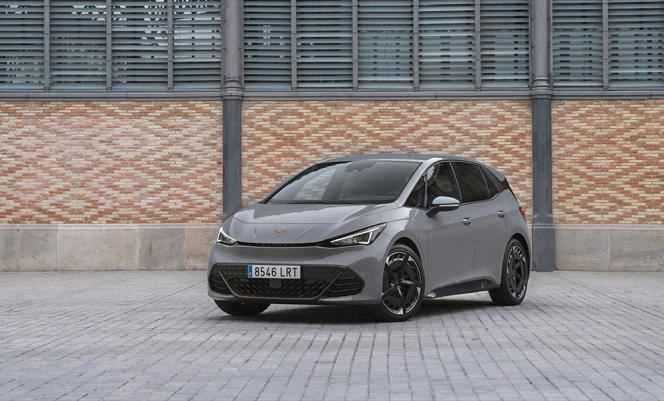The electrification of the automotive sector always generates more new signatures, as if it were preferable to start from a blank page to change era. Like Polestar and Lynk & Co, created by Volvo, and Ioniq or BZ, inducted respectively by Hyundai and Toyota, the Volkswagen group has been enriched by Cupra. A brand that will focus exclusively on the sale of electric vehicles and would see itself on the edge of the premium market by attracting a wider clientele.
Originally, this label designated the sports versions of Seat, a Spanish manufacturer with a popular vocation within the German group. Change of direction: having become a full-fledged brand in 2018, Cupra is feeling its wings growing and is now unashamedly positioned a notch above Volkswagen. Its first all-electric model, the Born, a name inspired by a trendy district of Barcelona, has been on sale since November 18 from 40,250 euros (bonus of 6,000 euros not deducted). In the same configuration – 204 horsepower and a 58 kilowatt-hour (kWh) battery for a range of 424 km) – the Volkswagen ID.3, from which it is closely derived, is offered from 38,380 euros.
In January 2022, a less efficient version (150 horsepower, a 45 kWh battery for a range of 349 km) will be launched around 36,000 euros, a price still higher than its counterpart in the Volkswagen range. The Born is also preparing to introduce, from April 2022, a more powerful engine (230 hp) which will have no equivalent in the ID.3 range. Benefiting from a sportier and more polished presentation than its alter ego – the two vehicles are manufactured in the German factory in Zwickau – the Born is also better equipped. A preferential treatment that does not go without crying some teeth in the rest of the VW galaxy, already strong with eight car companies.
“The group has many traditional brands, with a strong heritage, and it will need Cupra in the face of emerging competitors, particularly Chinese, which will enter the electric car market”, pleads Wayne Griffiths, the president of Seat-Cupra. Decided to “Propose models that are more emotional than strictly rational”, the Spanish manufacturer intends to be halfway “Between high-volume generalists and premium manufacturers”. A position left vacant in the VW group, which, moreover, has been seeking for a long time to have a chic and Latin brand. In recent years, this has prompted him to try, but without success, to buy Alfa Romeo (Stellantis group), which must also switch to all-electric in the coming years.
Relatively encouraging start to sales
By setting up a range from scratch, the managers of Cupra believe that it will be easier for them to capture a young clientele with high purchasing power, until then little inclined to opt for a Volkswagen, a Skoda or an Audi. Customers open to a different relationship to the automobile offered by the monthly rental formulas introduced by the manufacturer in Germany. The relatively encouraging start in Cupra sales (116,000 units in nearly three years), mainly attributable to the Formentor crossover available in a plug-in hybrid version, encourages them to dig into this furrow.
The wish of the brand is to reach the bar of 1% penetration in Europe, or roughly the sales of Mini
The two other products planned by 2025 confirm the desire to install Cupra as a rather posh brand. The future Tavascan SUV would see itself as a rival to Tesla’s Model Y, while it has already been noted that the small urban vehicle announced by the UrbanRebel concept car will be charged more than the corresponding Volkswagen model.
The brand’s wish is to reach the bar of 1% penetration in Europe, or roughly the sales of Mini, already crossed in Germany and Spain (1.2%), but still far from being within reach. hand in other markets, particularly in France (0.2%). This objective would undoubtedly suppose to go further in the differentiation of the models of the young mark which, beyond the marketing efforts from which they benefit, remain very close to those of the Volkswagen range in terms of style and performance.
Matrix of Cupra, Seat risks for its part to suffer from a transfer of substance. No electric vehicle is currently planned in the product plan of the Catalan manufacturer, which has been responsible for clearing the territory of new mobility, in particular by marketing scooters and scooters. A brand moderately compatible with the vision of the automobile which now inspires – but not only – the Volkswagen group: to manufacture less, but to sell more expensive.
